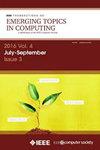Linearizing Binary Optimization Problems Using Variable Posets for Ising Machines
IF 5.1
2区 计算机科学
Q1 COMPUTER SCIENCE, INFORMATION SYSTEMS
IEEE Transactions on Emerging Topics in Computing
Pub Date : 2024-03-30
DOI:10.1109/TETC.2024.3403871
引用次数: 0
Abstract
Ising machines are next-generation computers expected to efficiently sample near-optimal solutions of combinatorial optimization problems. Combinatorial optimization problems are modeled as quadratic unconstrained binary optimization (QUBO) problems to apply an Ising machine. However, current state-of-the-art Ising machines still often fail to output near-optimal solutions due to the complicated energy landscape of QUBO problems. Furthermore, the physical implementation of Ising machines severely restricts the size of QUBO problems to be input as a result of limited hardware graph structures. In this study, we take a new approach to these challenges by injecting auxiliary penalties preserving the optimum, which reduces quadratic terms in QUBO objective functions. The process simultaneously simplifies the energy landscape of QUBO problems, allowing the search for near-optimal solutions, and makes QUBO problems sparser, facilitating encoding into Ising machines with restriction on the hardware graph structure. We propose linearization of QUBO problems using variable posets as an outcome of the approach. By applying the proposed method to synthetic QUBO instances and to multi-dimensional knapsack problems, we empirically validate the effects on enhancing minor-embedding of QUBO problems and the performance of Ising machines.利用伊辛机的可变 Posets 实现二元优化问题的线性化
伊辛机器是下一代计算机,有望有效地对组合优化问题的近最优解进行采样。将组合优化问题建模为二次型无约束二元优化问题,并应用于伊辛机。然而,由于QUBO问题复杂的能量格局,目前最先进的Ising机器仍然经常无法输出接近最优的解决方案。此外,由于有限的硬件图结构,伊辛机器的物理实现严重限制了要输入的QUBO问题的大小。在本研究中,我们采用了一种新的方法,通过注入辅助惩罚来保持最优,从而减少了QUBO目标函数中的二次项。该过程同时简化了QUBO问题的能量分布,允许搜索接近最优的解决方案,并使QUBO问题更稀疏,便于在限制硬件图结构的情况下编码到Ising机器中。我们提出了线性化的QUBO问题,使用变量偏置集作为该方法的结果。通过将该方法应用于综合QUBO实例和多维背包问题,实证验证了该方法在增强QUBO问题的小向量嵌入和伊辛机性能方面的效果。
本文章由计算机程序翻译,如有差异,请以英文原文为准。
求助全文
约1分钟内获得全文
求助全文
来源期刊

IEEE Transactions on Emerging Topics in Computing
Computer Science-Computer Science (miscellaneous)
CiteScore
12.10
自引率
5.10%
发文量
113
期刊介绍:
IEEE Transactions on Emerging Topics in Computing publishes papers on emerging aspects of computer science, computing technology, and computing applications not currently covered by other IEEE Computer Society Transactions. Some examples of emerging topics in computing include: IT for Green, Synthetic and organic computing structures and systems, Advanced analytics, Social/occupational computing, Location-based/client computer systems, Morphic computer design, Electronic game systems, & Health-care IT.
 求助内容:
求助内容: 应助结果提醒方式:
应助结果提醒方式:


